Penny Serenade Blu-ray Movie
HomePenny Serenade Blu-ray Movie 
Olive Films | 1941 | 119 min | Not rated | Aug 27, 2013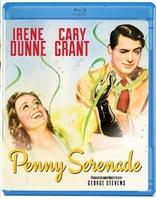
Movie rating
6.8 | / 10 |
Blu-ray rating
| Users | 2.5 | |
| Reviewer | 3.5 | |
| Overall | 2.8 |
Overview
Penny Serenade (1941)
A couple's big dreams give way to a life full of unexpected sadness and unexpected joy.
Starring: Irene Dunne, Cary Grant, Beulah Bondi, Edgar Buchanan, Ann DoranDirector: George Stevens (I)
| Romance | Uncertain |
| Drama | Uncertain |
Specifications
Video
Video codec: MPEG-4 AVC
Video resolution: 1080p
Aspect ratio: 1.37:1
Original aspect ratio: 1.37:1
Audio
English: DTS-HD Master Audio Mono
Subtitles
None
Discs
25GB Blu-ray Disc
Single disc (1 BD)
Playback
Region A (C untested)
Review
Rating summary
| Movie | 3.5 | |
| Video | 3.5 | |
| Audio | 4.0 | |
| Extras | 0.0 | |
| Overall | 3.5 |
Penny Serenade Blu-ray Movie Review
Was Kleenex involved in this production?
Reviewed by Jeffrey Kauffman August 26, 2013Actors trained in the so-called Method will often talk about “sense memory”, but any old Tom, Dick, or Harriet experiences this technique any time some long buried event bubbles up in the mind due to some provocation from external stimuli. Think of entering a house and smelling chocolate chip cookies in the oven, at which point your mind drifts back to some long ago day when your Mother was baking. Or how you are instantly transported to the time and place you first heard some emotionally evocative piece of music when it plays again contemporaneously. That particular kind of “sense memory” is what drives the frankly pretty maudlin 1941 George Stevens effort Penny Serenade, a film which became a staple of local television programming once it entered the public domain in the late sixties. (I for one can’t count how many times I turned on the television of my local Public Broadcasting station through the years and saw phonograph records spinning, knowing instantly that yet another broadcast of this film was taking place.) Penny Serenade uses the framing device of a real-life record album, back in the days when album meant album—as in a bound case holding more than one item. Long playing records of course hadn’t yet been invented and the reigning format of 78s did not allow for much time on any given side, and so many records were typically included in one album to provide a complete program of music. In this particular case, the couple at the core of the story meet in a music store, and the woman has kept a sonic diary of sorts of her ultimate marriage to the man in an album also stuffed with little mementos from their years together. As the film begins, it’s clear that the marriage has hit a rough patch, possibly one from which it will be impossible to recover, and the woman puts one record after another on the turntable, remembering the events that are tied to that particular song.
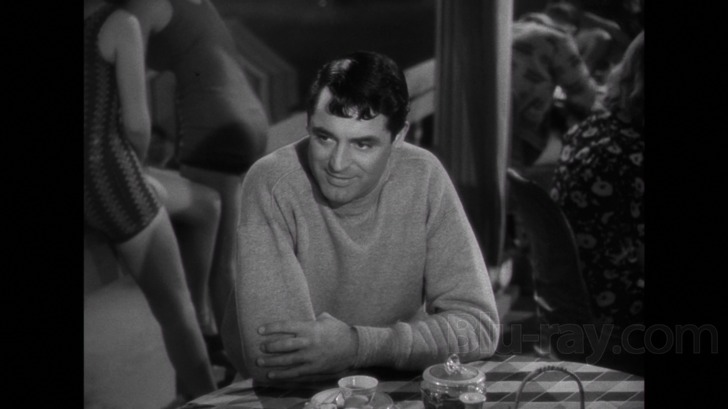
Penny Serenade would seem to be a rather odd entry in director George Stevens’ filmography. While Stevens’ oeuvre is spectacularly varied, including everything from musicals (Swing Time) to huge religious epics (The Greatest Story Ever Told ), one thing that united virtually all of his works was an absolute dearth of overt sentimentality. And yet Penny Serenade is one of the most relentlessly lachrymose films of its era, an effort which doesn’t just wear its heart on its sleeve, it virtually slathers its emotions across the screen in a nonstop parade of heartstring tugging (some might aver yanking) scenes that no doubt earned the film its longstanding reputation as a “three hankie weeper”.
Julie (Irene Dunne) is an attractive young woman who works at a metropolitan music store, the kind of emporium that was very popular during this era, and one which would pipe the latest releases out onto the street so that passersby could hear the tunes and hopefully be persuaded to buy them. Julie has popped “You Were Made For Me” onto the turntable, but the record has a skip, causing it to stutter over and over and drawing the attention of Roger (Cary Grant), who is about to be on his way but thinks better of it once he spies the pretty Julie in the store. And so a burgeoning romance is born, one that is highlighted by the typical ups and downs of a newfound love affair, although in this film’s central conceit, one that also is accompanied by a parade of tunes marking various chapter stops in the duo’s relationship.
Julie and Roger of course do tie the knot and things seem to be rather romantic for the pair, especially when they move to Japan so that Roger can take a job there. Tragedy strikes, however, when Japan suffers a major earthquake (depicted in the film with some rather startling special effects—at least for a supposed romantic drama) which causes Julie to miscarry and prevents her from ever having a natural born child. The two are of course forlorn but decide that adoption would be a more than acceptable alternative, at which point they turn to kindly Miss Oliver (Beulah Bondi) with a laundry list of desirable attributes they want in a child, including curly hair and a male gender. Miss Oliver can’t quite accede to their request, but she does ultimately present them with a lovely baby girl, one she keeps repeating is “like no other baby in the world”.
That provides the one extended comic sequence in Penny Serenade, where Julie and Roger have to come to terms with learning parenting skills on the fly. They figure out how to keep little Trina safe in a bed since they have no crib yet, and how to quiet her nighttime wails of loneliness. Near tragedy strikes yet again when Roger loses his job and a judge threatens to take Trina away since it appears her adoptive parents are in danger of becoming indigent. But Roger gives an impassioned speech before the judge—the kind that would be more at home in a Capra film than a Stevens outing—and of course Trina is allowed to stay with the family. All seems to be going relatively swimmingly, with Trina growing into young childhood and taking part in a Christmas Pageant where she gets to move the Star of Bethlehem across the nighttime sky. But this being a tearjerker and all, tragedy of course strikes again, which leads to an “alienation of affection”, as divorce documents frequently describe the situation when married partners drift apart.
Perhaps surprisingly, though Irene Dunne gets the bulk of the misty eyed forlorn longing moments in the film, it was Cary Grant who actually snagged the film’s only Oscar nomination, his first of only two Best Actor Academy Award nominations over his very long career (the other was for Clifford Odets’ None But the Lonely Heart in 1945). Grant is actually rather tamped down for a great deal of this film, not at all the ebullient and suave character he tended to play as he graduated into elder statesman roles. Edgar Buchanan, whom Baby Boomers will associate with Petticoat Junction, is on hand giving a surprisingly low key performance himself as a broad shoulder to cry on and best friend to confide in.
Penny Serenade is so insistently manipulative with regard to homespun emotionalism that some cynics may go into diabetic sugar shock. But the film is undeniably moving, although the “miracle” that finally brings the couple close to reconciliation is so contrived (and completely illogical if one thinks even a moment about it) that it strains credulity to the breaking point. While there is an uncommon amount of sentimentality in this film, one that would seem to be at odds with Stevens’ general directorial sense, there’s also a rather hardnosed depiction of the ups and downs of most every married life. If the ostensibly happy ending tends to skirt past deeper issues which still remain as unspoken subtext for what has gone before, it at least gives hope to those who may have experienced trauma in their own married lives and want to know that there’s a light at the end of the marital tunnel.
Penny Serenade Blu-ray Movie, Video Quality 
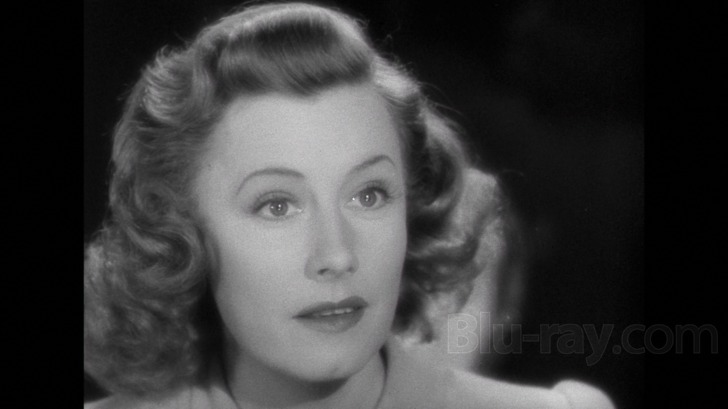
Penny Serenade is presented on Blu-ray courtesy of Olive Films with an AVC encoded 1080p transfer in 1.37:1. The elements here are not in perfect condition, but the damage they display is typically limited to small blemishes like white flecks or occasional minor scratches, along with just one or two instances of warping. The biggest issue here is some moderately variable contrast, which at times can coat certain sequences with a kind of milky white overlay. Other than these passing anomalies, the rest of this high definition presentation is quite good, with pleasing gray scale and good fine detail in close-ups. Many of Dunne's scenes were shot with filters which should not be mistaken for a "soft" transfer. In typical Olive fashion, no digital tweaking has been done to the elements.
Penny Serenade Blu-ray Movie, Audio Quality 
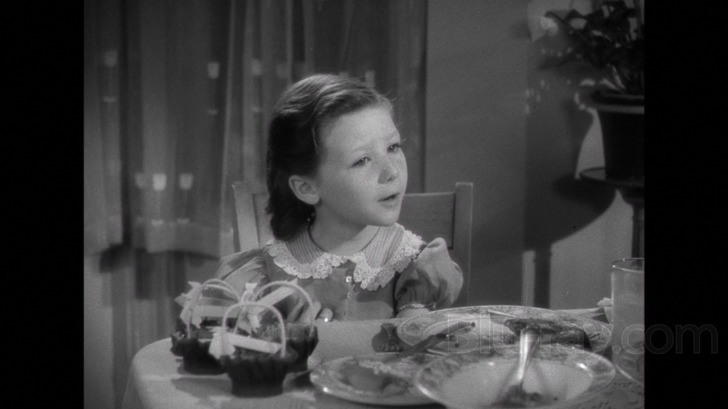
Penny Serenade's lossless DTS-HD Master Audio Mono track sounds rather good, all things considered. Dialogue is presented cleanly and clearly, and the film's use of music comes through very well, with only a small amount of the requisite boxiness which belies the film's age and the recording technologies available back then. Dynamic range is somewhat limited here due to the film's focus on intimate dialogue moments, but there is one burst of sonic activity during the earthquake sequence.
Penny Serenade Blu-ray Movie, Special Features and Extras 
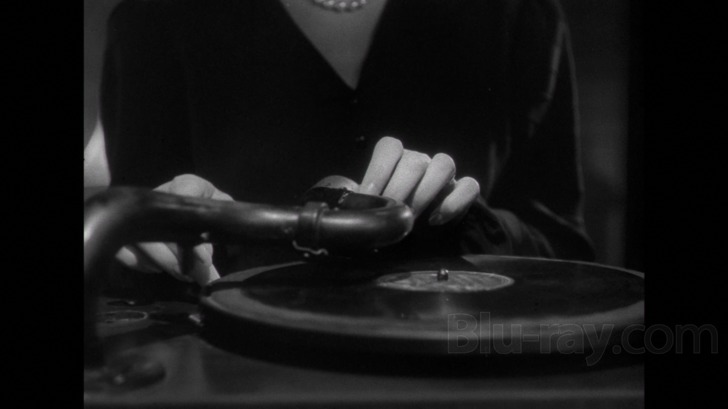
No supplements are offered on this Blu-ray disc.
Penny Serenade Blu-ray Movie, Overall Score and Recommendation 
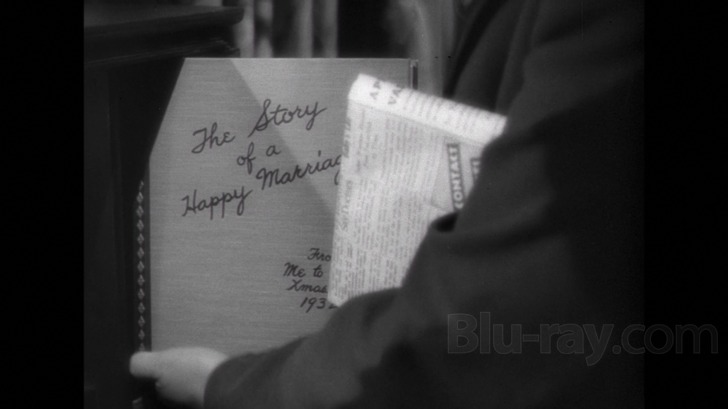
There is just no denying the patently manipulative quality of much of the second half of Penny Serenade, but I defy any feeling human being not to have at least a lump in the throat as the film comes to its bittersweet conclusion. Dunne really is the emotional anchor here, despite Grant's Oscar nomination, and she gives a lovely, if somewhat narrowly focused, performance (as dictated by the script). The supporting cast is colorful and enjoyable and even though this film tugs on the heartstrings hard enough to rip your aorta clean out of your body, Penny Serenade comes Recommended.
Similar titles
Similar titles you might also like

Endless Love
2014

The Light Between Oceans
2016

The Miseducation of Cameron Post
Special Edition
2018

Much Ado About Nothing
2012

The Rose
1979

On Chesil Beach
2017

Ethan Frome
1993

The Choice
2016

Brooklyn
2015

Me Before You
2016

Othello
1995

The Disappearance of Eleanor Rigby
Includes "Him", "Her", and "Them" Cuts
2014

Some Came Running
Warner Archive Collection
1958

Romeo and Juliet
2013

A Place in the Sun
Paramount Presents #22
1951

Evening
2007

Away From Her
2007

The Shipping News
2001

Moonlight Mile
2002

Romeo and Juliet
1968